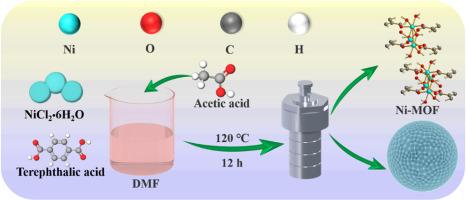Application and performance Enhancement of acetic acid-Regulated ligand defect engineering in NiMOF electrocatalysts
IF 8.1
2区 工程技术
Q1 CHEMISTRY, PHYSICAL
引用次数: 0
Abstract
Introducing organic ligands into metal-organic frameworks (MOFs) is an effective method for preparing defective MOFs. This approach enables the fabrication of cost-effective, efficient, highly conductive, and richly active-site electrocatalysts. Herein, the defective NiMOF is synthesized via a straightforward one-pot solvothermal method by partially substituting phthalic acid (PTA) ligands with acetic acid (HOAc), which effectively regulates the micro-morphology and electronic structure of the NiMOF nanoflowers, thus creating abundant electrochemical active sites, significantly improving electronic conductivity and promoting rapid charge transfer. The resulting DE-NiMOF-0.5 nanoflowers, prepared with HOAc substitution, demonstrate excellent electrochemical performance at a current density of 10 mA cm−2, the hydrogen evolution reaction (HER) overpotential is 188 mV (Tafel slope of 175 mV dec−1), while the oxygen evolution reaction (OER) overpotential is 205 mV (Tafel slope of 37 mV dec−1). The introduction of acetic acid ligands in DE-NiMOF-0.5 not only constructs the ligand defects within the catalyst, but also increases the abundant active sites, enhancing the hydrophilicity of the catalyst and facilitating electronic transfer between the catalyst surface and the electrolyte. This study explores a strategy for preparing defective MOF catalysts through introducing modulators, providing an economically viable material pathway for electrocatalysis and opening new possibilities for designing and synthesizing efficient electrocatalysts in future research endeavors.

醋酸调节配体缺陷工程在 NiMOF 电催化剂中的应用和性能提升
将有机配体引入金属有机框架(MOFs)是制备缺陷 MOFs 的有效方法。通过这种方法可以制备出具有成本效益、高效、高导电性和丰富活性位的电催化剂。本文通过乙酸(HOAc)部分取代邻苯二甲酸(PTA)配体,采用简单的一锅溶热法合成了缺陷NiMOF,有效地调节了NiMOF纳米花的微观形貌和电子结构,从而形成了丰富的电化学活性位点,显著提高了电子传导性,促进了电荷的快速转移。用 HOAc 取代制备的 DE-NiMOF-0.5 纳米花束在 10 mA cm-2 的电流密度下表现出优异的电化学性能,氢进化反应(HER)过电位为 188 mV(Tafel 斜坡为 175 mV dec-1),而氧进化反应(OER)过电位为 205 mV(Tafel 斜坡为 37 mV dec-1)。在 DE-NiMOF-0.5 中引入醋酸配体不仅能在催化剂内部构建配体缺陷,还能增加丰富的活性位点,增强催化剂的亲水性,促进催化剂表面与电解质之间的电子转移。本研究探索了一种通过引入调制剂制备缺陷 MOF 催化剂的策略,为电催化提供了一种经济可行的材料途径,并为未来研究工作中设计和合成高效电催化剂提供了新的可能性。
本文章由计算机程序翻译,如有差异,请以英文原文为准。
求助全文
约1分钟内获得全文
求助全文
来源期刊

International Journal of Hydrogen Energy
工程技术-环境科学
CiteScore
13.50
自引率
25.00%
发文量
3502
审稿时长
60 days
期刊介绍:
The objective of the International Journal of Hydrogen Energy is to facilitate the exchange of new ideas, technological advancements, and research findings in the field of Hydrogen Energy among scientists and engineers worldwide. This journal showcases original research, both analytical and experimental, covering various aspects of Hydrogen Energy. These include production, storage, transmission, utilization, enabling technologies, environmental impact, economic considerations, and global perspectives on hydrogen and its carriers such as NH3, CH4, alcohols, etc.
The utilization aspect encompasses various methods such as thermochemical (combustion), photochemical, electrochemical (fuel cells), and nuclear conversion of hydrogen, hydrogen isotopes, and hydrogen carriers into thermal, mechanical, and electrical energies. The applications of these energies can be found in transportation (including aerospace), industrial, commercial, and residential sectors.
 求助内容:
求助内容: 应助结果提醒方式:
应助结果提醒方式:


